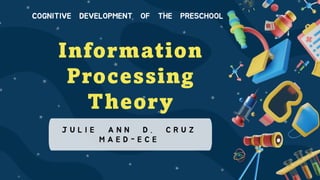
Information Processing Theory-Cog...pptx
- 1. J U L I E A N N D . C R U Z M A E D - E C E Information Processing Theory COGNITIVE DEVELOPMENT OF THE PRESCHOOL
- 3. What is IPT? • IPT (Information Processing Theory) • cognitive theory that focuses on how information is encoded into our memory. • describes how our brains filter information, from what we’re paying attention to in the present moment, to what gets stored in our short-term or working memory and ultimately into our long-term memory. • not only explains how information is captured, but how it is stored and retrieved as well
- 4. GEORGE A. MILLER Quick Background • American Psychologist • One of the proponent of IPT • Discovered about the 7 plus or minus 2 items. • The IPT development pertains to the study and analysis of what occurs in a person’s mind as he or she receives a bit of information (1956) • IPT later developed by John William Atkinsons and Richard Shiffrin- Multi-stage theory of memory. • Alan Baddeley and Graham Hitch-Working Memory Model
- 5. • Information stores- different places in mind where information is stored (sensory memory, short-term memory, long term memory and more) • Cognitive processes- various processes that transfer memory among different memory stores. (perception, coding, recording, chunking, and retrieval.) • Executive cognition- awareness of the individual of the way information is processed within him or her. (strengths and weakness) Elements of Information Processing Theory
- 6. MODELS of Information processing theory 0
- 7. MODELS of Information processing theory • Sensory Memory- It holds the information that the mind perceives through various senses Iconic Memory Lasts half a second Echoic Memory Lasts for 3 to 4 seconds Auditory Information Visual Information
- 8. MODELS of Information processing theory • Short-Term Memory-Information in short-term memory only lasts around 30 seconds. Cognitive abilities affect how individuals process information in working memory. - Baddeley and Hitch Working Memory Model 7 2 + - Remember:
- 9. MODELS of Information processing theory • Central Executive- It is considered the control center of the mind where information processes are regulated between various memory stores. • Visuo-Spatial Sketch Pad- it holds spatial and visual information. It helps the mind imagine objects and maneuver through the environment • Phonological Loop- holds auditory information. - Phonological Store - Articulatory Rehearsal process • Episodic Buffer- believed that the episodic buffer transfers information between short-term memory, perception, and long-term memory. It acts as a connector for the long-term memory.
- 10. MODELS of Information processing theory • Long Term Memory-It is thought that long-term memory has an unlimited amount of space as it can store memories from a long time ago to be retrieved later. • Various methods are used to store information in the long-term memory such as repetition, connecting information, relating information to meaningful experience or other information, and breaking up the information into smaller chunks. Like the Short-term memory it is also divided in to two types: EXPLICIT-Declarative Knowledge(Knowing that) IMPLICIT- Procedural Knowledge(Knowing how)
- 11. MODELS of Information processing theory One of the earliest and most influential distinctions of long-term memory was proposed by Tulving (1972). EXPLICIT • EPISODIC (experienced events)- responsible for storing information about events (i.e. episodes) that we have experienced in our lives. • SEMANTIC (Knowledge and Concepts)- responsible for storing information about the world. This includes knowledge about the meaning of words, as well as general knowledge. IMPLICIT • PPROCEDURAL (Skills and Actions)-responsible for knowing how to do things, i.e., memory of motor skills. • Emotional Conditioning
- 12. CLASSROOM APPLICATIONS Now that we have a basic understanding of the learning process, how can we apply this information to improve student performance in the classroom? 1. Learning Objectives 2. Engagement strategies 3. Elaborative Rehearsal 4. Repetitions for retrieval
- 13. TanhK YOU!